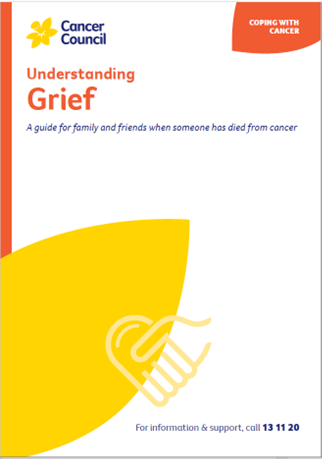- Home
- About Cancer
- Advanced cancer
- Understanding grief
- How you might feel
- Relationships
Relationships
Grief affects how you interact with the world, your identity, and the roles you have within your family or social circle. You may find that your friendships and family relationships change.
Learn some tips for staying connected with others.
A sense of presence
It is common to feel a sense of closeness to the person who died. People often report that they see, sense or dream about the person, especially in the first few weeks. Most people find this comforting; but some may find it frightening and unexpected.
Loneliness
People often feel intensely lonely. You may have lost someone you shared activities with, or if your caring role was a major part of your life, you may feel lost without it. It can take time to work out a new routine or identity.
After some time has passed, you may still feel your loss very strongly, but find that others seem to have moved on. This can be hurtful and make you feel alone, and you may withdraw from those around you. By trying new activities and groups, you may form new and supportive friendships.
Abandonment
You may feel abandoned and rejected by the person who died. Or you may feel neglected by family members and friends you thought would be there for you. You may be surprised by who offers the support you need – often it’s someone who has experienced a major loss themselves.
Conflict
It’s common for families to experience conflict at the time of death and afterwards. Because everyone grieves in their own way and in their own time, you may have disagreements with family members and friends after someone dies. There may also be conflicts over the person’s will and who gets their treasured possessions. It is important to get support through these difficulties.
Tips for staying connected with others
- Know that you are not alone. Loss is part of being human. Find someone you can talk to who will listen and be understanding, or ask your GP or palliative care service about bereavement counselling.
- Find ways to stay connected to people who have died. Read some ideas for ways to remember.
- Read other people’s accounts of grief. Find stories online, through bereavement support groups or resources at your local library.
- Join a support or grief group if there is one available, or consider an online group. Call Cancer Council 13 11 20 to find a support group.
- Share your thoughts about the dying process with the people who were there with you.
- Ask others for assistance – it will make them feel valued and useful.
- Re-enter your social circle slowly. At first, mix with people you feel comfortable with and who understand you well. Even if you are just sitting and listening, you are connecting to others.
- Consider who can meet your different needs. Some people might be good at providing practical help, while others are better at providing emotional support.
- When you feel ready, join a social group or take up a new activity. Recognise that the first time you return to an activity, such as going to the shops, club, school or work, is likely to be the hardest. It tends to get easier with time, but asking someone to come along with you can make the initial steps feel less daunting.
- Be gentle and forgiving with others and yourself. Grieving family members and friends may seem angry or irrational. Try not to take it personally. Keep in mind that you are vulnerable too and have the right to protect yourself. Let someone else support them for a time.
→ READ MORE: Common questions about grief
Podcast: Coping with Grief
Listen to more episodes from our podcast for people affected by cancer
A/Prof Lisa Beatty, Associate Professor in Clinical Psychology and Consulting Clinical Psychologist, Flinders University Institute of Mental Health and Wellbeing, SA; Sandra Anderson, Consumer; Dr Alexandra Clinch, Palliative Medicine Specialist and Deputy Director, Palliative Care, Peter MacCallum Cancer Centre and Royal Melbourne Hospital, VIC; Christopher Hall, Chief Executive Officer, Grief Australia; Nathan MacArthur, Specialist Grief Counsellor and Accredited Mental Health Social Worker, Sydney Grief Counselling Services, NSW; Linda Magann, Clinical Nurse Consultant – Palliative Care, St George Hospital, NSW; Palliative Care Australia; Richard Upton, Consumer; Lesley Woods, 13 11 20 Consultant, Cancer Council WA.
View the Cancer Council NSW editorial policy.
View all publications or call 13 11 20 for free printed copies.
Need to talk?
Support services
Caring for someone with cancer
Speak to a health professional or to someone who has been there, or find a support group or forum
Cancer Council Online Community
A community forum – a safe place to share stories, get tips and connect with people who understand
Cancer information
Emotions and cancer
People who are affected by cancer in some way can experience a range of emotions, that can be very challenging to deal with at times. Learn more.
End of life
This information may help you better cope with end of life, or support someone who may be dying with cancer
